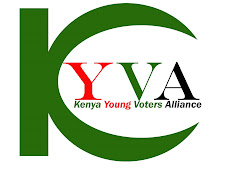KYVA is a conglomerate of organizations and individuals committed to ensuring that Kenya as a country manages to achieve set developmental goals to meet both the international and national targets. The idea was mooted by the (SONU) leadership of 2003/4. KYVA leadership is composed of diverse backgrounds and experiences. We urge all Kenyan youths to take charge of leadership at the counties and national levels. Register as voters and vote in large numbers for young visionary leaders.
Sunday, October 4, 2009
NEW CURRICULUM: GOVERNMENT ADMITS FAILURE IN ADDRESSING ESOURCES INEQUALITIES IN SCHOOLS.
Dear Sir/Madam,
To the delight of some students and teachers, the Kenya Institute of Education (KIE) in conjunction with the Ministry of Basic Education has come up with a simpler mathematics and science curriculum that comes into effect next year. It is ostensibly formulated for secondary school students who loath the subjects and do not wish to pursue them at a higher level. The curriculum, KIE argues, also takes cognizance of the fact that there are ill equipped schools which can only afford to offer less practical oriented general science subjects.
Prima facie, this sounds a great policy directive. However, the devil lies in the detail. A good curriculum ought not to be discriminative and must play a significant role in human resource development and placement. But looking at it from all angles, this curriculum bears the hallmarks of the Government`s discrimination against the less fortunate members in the country. Is this the way to go with curriculum changes? I do not think so.
First, this is undoubtedly the beginning of what may appear as a deconstructive policy but which will in the long run inevitably and increasingly see the poor condemned eternally to certain cadre of jobs in the society. In my estimation it appears as if the Government is admitting its failure in addressing issues relating to access, equity and quality of education across the social divide as was promised in the Sessional paper no.1 of 2005. Under a targeted programme the Government was supposed to rehabilitate and provide laboratory equipment in schools in the rural and marginalized areas in a bid to address regional disparities. By implementing such a curriculum the Government is reneging on its promise to help rid resources inequalities in schools. Yet it is abundantly clear that children from affluent homes enroll in well equipped schools and perform relatively better in science oriented subjects. It follows that such students end up taking all the slots in the few but competitive pure science related careers in the Universities.
Secondly, such a curriculum may unfortunately appear to have given managers of some schools especially those in the rural and marginalized areas and whose schools have limited resources, a carte blanche to force down the throats of students and teachers the less glamorous option. It is largely because of this fear that I do not just see the reason for the jubilation. I am extremely afraid that the complacency now setting in is both foolish and dangerous.
Thirdly, the Government seems to be suggesting that students from disadvantaged schools will never become engineers and doctors, and by all indications, it will be sending a strong message to the public that students from disadvantaged schools are lesser citizens than their counterparts. This is an inconceivable form of human discrimination that I have never come across. But this does not come as a surprise. Over the years the government has abdicated its responsibility in helping build and equip rural schools to enable students from poor rural schools pursue pure science related careers. Much as we all agree that the acute inequalities in schools in the country have over the years made it impossible for the construction of a consistent, reliable and valid performance measurement, but should that be a ground for the entrenching of a discriminatory and retrogressive curriculum change? Certainly not. Two wrongs do not make a right.
Fourthly, what good will it do to a learner/teacher whose interest is in learning/teaching pure sciences or pure mathematics but who is forced by the school management due to unavailability of resources to only learn/teach the general sciences or simplified mathematics? From the foregoing, the question shouldn’t be whether the Government can afford to do more to promote social mobility. It should be whether Government can afford not to. And the answer is no.
TOME FRANCIS,
BUMULA CONSTITUENCY.
Subscribe to:
Post Comments (Atom)

No comments:
Post a Comment